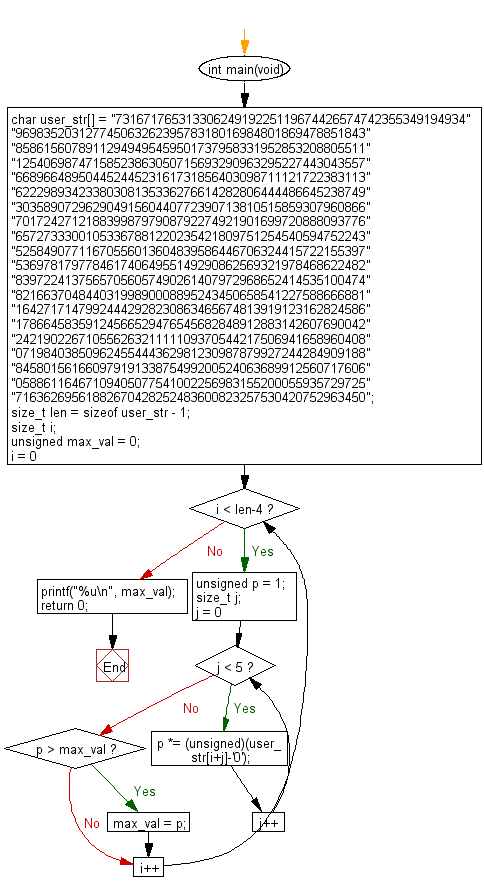C Exercises: Numbers with 13 adjacent digits have highest product
24. Greatest Product in 20x20 Grid Variants
The four adjacent digits in the 1000-digit number that have the greatest product are 9 × 9 × 8 × 9 = 5832.
73167176531330624919225119674426574742355349194934
96983520312774506326239578318016984801869478851843
85861560789112949495459501737958331952853208805511
12540698747158523863050715693290963295227443043557
66896648950445244523161731856403098711121722383113
62229893423380308135336276614282806444486645238749
30358907296290491560440772390713810515859307960866
70172427121883998797908792274921901699720888093776
65727333001053367881220235421809751254540594752243
52584907711670556013604839586446706324415722155397
53697817977846174064955149290862569321978468622482
83972241375657056057490261407972968652414535100474
82166370484403199890008895243450658541227588666881
16427171479924442928230863465674813919123162824586
17866458359124566529476545682848912883142607690042
24219022671055626321111109370544217506941658960408
07198403850962455444362981230987879927244284909188
84580156166097919133875499200524063689912560717606
05886116467109405077541002256983155200055935729725
71636269561882670428252483600823257530420752963450.
Write a C programming to find the thirteen adjacent digits in the 1000-digit number that have the greatest product. What is the value of this product?
C Code:
#include <stdio.h>
int main(void)
{
char user_str[] =
"73167176531330624919225119674426574742355349194934"
"96983520312774506326239578318016984801869478851843"
"85861560789112949495459501737958331952853208805511"
"12540698747158523863050715693290963295227443043557"
"66896648950445244523161731856403098711121722383113"
"62229893423380308135336276614282806444486645238749"
"30358907296290491560440772390713810515859307960866"
"70172427121883998797908792274921901699720888093776"
"65727333001053367881220235421809751254540594752243"
"52584907711670556013604839586446706324415722155397"
"53697817977846174064955149290862569321978468622482"
"83972241375657056057490261407972968652414535100474"
"82166370484403199890008895243450658541227588666881"
"16427171479924442928230863465674813919123162824586"
"17866458359124566529476545682848912883142607690042"
"24219022671055626321111109370544217506941658960408"
"07198403850962455444362981230987879927244284909188"
"84580156166097919133875499200524063689912560717606"
"05886116467109405077541002256983155200055935729725"
"71636269561882670428252483600823257530420752963450";
size_t len = sizeof user_str - 1;
size_t i;
unsigned max_val = 0;
for (i = 0; i < len-4; i++) {
unsigned p = 1;
size_t j;
for (j = 0; j < 5; j++) {
p *= (unsigned)(user_str[i+j]-'0');
}
if (p > max_val) {
max_val = p;
}
}
printf("%u\n", max_val);
return 0;
}
Sample Output:
40824
Flowchart:

For more Practice: Solve these Related Problems:
- Write a C program to find the greatest product of four adjacent numbers horizontally in a 20x20 grid.
- Write a C program to compute the greatest product of four adjacent numbers vertically in a 20x20 grid.
- Write a C program to find the greatest product of four adjacent numbers diagonally in a 20x20 grid and return their coordinates.
- Write a C program to compare the maximum products in different directions in a 20x20 grid and output the highest overall.
Go to:
PREV : 1001st Prime Number Variants.
NEXT : First Missing Positive Integer Variants.
C Programming Code Editor:
Contribute your code and comments through Disqus.
What is the difficulty level of this exercise?
Test your Programming skills with w3resource's quiz.
